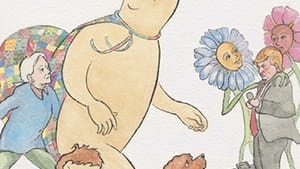Stay in the Loop
BSR publishes on a weekly schedule, with an email newsletter every Wednesday and Thursday morning. There’s no paywall, and subscribing is always free.
Rise up!
'Meet John Dough, Superhero: A Political Fantasy,' by Lucy Bell Wait Jarka-Sellers

There is nothing allegorical about Philadelphia-based writer and illustrator Lucy Bell Wait Jarka-Sellers’s Meet John Dough, Superhero: A Political Fantasy. Despite its subtitle, this slim and satisfying novel with satirical drawings takes place firmly in the here and now.
A fairy tale for our times
The book begins, “It was the year 2017. . . . President Trump was threatening journalists, appointing his family members to important cabinet posts, and lying so consistently to the press and the people that no one even tried anymore to pretend that he cared about telling the truth."
Alida listens to the radio while stirring bread dough in her Germantown kitchen. A widow, she is more the story’s conjurer than its protagonist. As it turns out, the sticky mixture in the bowl turns out to be the answer to her (and our) desperation. The latest news — an Iowa congressman has praised a European nationalist for his “commitment to ethnic purity” — puts Quaker-educated Alida over the top. “If not Congress, who can save us?” she blurts.
And the dough begins to cry. Here begins the fantastical part: following a recipe (printed on a nameplate fastened around the dough-baby’s neck), Alida stirs 10 pounds of butter and mountains of flour in her clawfoot tub (with the help of her dog, Buddy, a Democrat preoccupied with climate change), then watches the yellowish mass spring to life as John Dough, homegrown superhero.
Alida sews him a patchwork cape and, along with Buddy, hammers out a four-point plan to save the nation. Because this is a fable, John Dough gets help from a cast that includes Larry (a Trump-hating Republican cat), an erudite pigeon he meets in 30th Street Station, and an avian delegation — hawks, doves, and loons (oh, yes, puns intended) — who fly from all corners of the United States to craft a bipartisan legislative agenda.
Pigeon philosophy
John Dough is a bit of a naïf, but he’s also reflective and willing to learn. When he intervenes in an attempted deportation — ICE agents are about to arrest an undocumented Honduran man — our superhero realizes that his action may provide only temporary relief. And when he saves a drunk from two teenaged bullies by depositing the aggressors in the branches of a black walnut, the inebriated victim stirs awake with a look of horror at his pasty-faced Samaritan. “Why you all always gotta hang men in trees?” he asks before blacking out again.
Moments like these temper the book’s whimsy, cautioning that well-meaning “rescues” may have unintended consequences and that history always shades the present moment.
Jarka-Sellers, a Germantown native schooled in classics at Harvard and Cornell and in art at the Boston Museum School and Pennsylvania Academy of the Fine Arts, formerly taught Latin, Greek, and philosophy at Germantown Friends School. She can’t help waxing pedagogical. The pigeon, Ben, flees 30th Street Station (“They’re very anti-pigeon here now,” he tells John Dough) and takes the superhero on a tour of Penn’s Woods for a lesson in colonial aspiration and betrayal.
I welcomed these educational digressions, not only because they deepen Jarka-Sellers’s tale but because I learned some things. I’d never heard of the Paxton Boys — the colonial version of the alt-right’s foot soldiers—who were poor, Irish-born, and egged on by their ministers to massacre one of the last communities of Indians in eastern Pennsylvania.
The Paxton Boys were never punished. And the take-home of this history lesson, in the words of sagacious Ben, is worth pocketing: “You can’t separate people into goodies and baddies. . . . We just have to keep trying to understand the forces that twist people toward cruelty, so that we can resist them — in ourselves too.”
Patriotism, in Jarka-Sellers’s world, is not about flags or slogans; it is a fierce and inclusive love. And the founding fathers, blinkered as they were, left a crucial legacy — chiefly, the egalitarian ideal, an equality based on each person’s potential for becoming good.
It’s a fantasy, sure. But Jarka-Sellers reminds us that our political destiny is in our hands. Any John Doe (or Jane Doe, for that matter) could rise to the occasion.
What, When, Where
Meet John Dough, Superhero: A Political Fantasy. By Lucy Bell Wait Jarka-Sellers. Philadelphia: Nyoka Press, 2017. $12, paperback. Click here.
Sign up for our newsletter
All of the week's new articles, all in one place. Sign up for the free weekly BSR newsletters, and don't miss a conversation.

 Anndee Hochman
Anndee Hochman